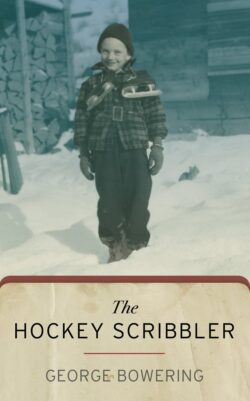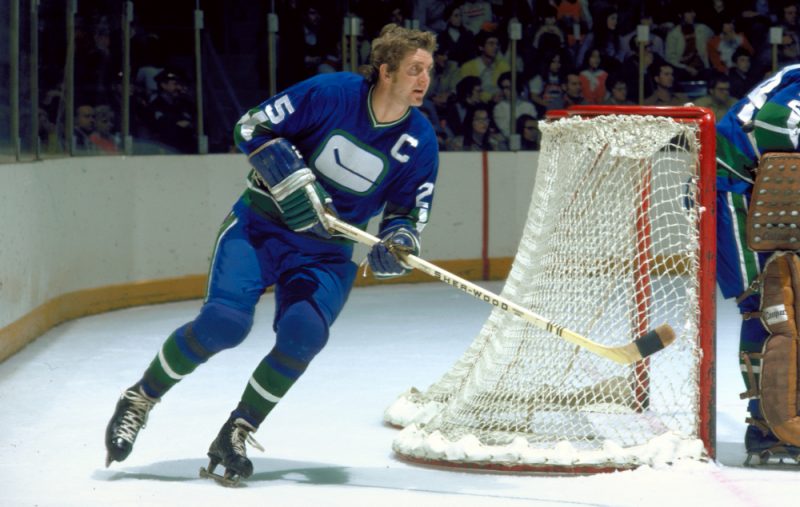#44 Freeze the book in the corner
The Hockey Scribbler
by George Bowering
Toronto: ECW Press, 2016
$19.95 / 9781770412897
Reviewed by Bruce McDougall
First published November 16, 2016
*
 If a mere hockey player like Wayne Gretzky were to write a book in which he criticized poets for ripping the feet off their anapests and bludgeoning scansion into a bloody pulp, George Bowering might feel justifiably defensive about his literary calling.
If a mere hockey player like Wayne Gretzky were to write a book in which he criticized poets for ripping the feet off their anapests and bludgeoning scansion into a bloody pulp, George Bowering might feel justifiably defensive about his literary calling.
So how should hockey aficionados feel when George Bowering, a mere poet, writes a book in which he passes judgment on elements of the game they revere?
I don’t know if Wayne Gretzky is a fan of poetry, but he won nine Hart Trophies as the NHL’s most valuable player, ten Art Ross Trophies for most points in a season, two Conn Smythe Trophies as playoff MVP, and five Lester B. Pearson Awards (now called the Ted Lindsay Award) for most outstanding player as judged by other players.

He also won the Lady Byng Trophy for sportsmanship five times and retired with his name on the Stanley Cup four times. All those gongs qualify him as a decent hockey player and have made him a wealthy man, but modesty would prevent him from passing judgment on poetry and the people who read and write it.
Comparing the popularity of literature and hockey in this country, Bowering has arguably accomplished more, against greater odds, than Gretzky or any other NHL player. As he reminds us several times in the course of this 240-page book, he is an Officer of the Order of Canada, served as Canada’s Parliamentary Poet Laureate, and received the Governor General’s Literary Award.
Bowering aspired at one time to work as a sports reporter for the St. Louis Post-Dispatch, although he would have preferred to write about baseball. Whether this qualifies him to pontificate on the game of hockey remains a question that only the reader can answer after finishing this book.
 For this reader, Bowering has added one more volume to the never-ending library of navel-gazing musings by egotistical wordsmiths aiming to attract a few bucks by gettin’ down wid da po folk who paint their faces blue and inscribe maple leaves on their bare chests before they join the other unshaven gap-toothed, knuckle-dragging Neanderthals in the cheap seats to bellow and grunt for their favourite hockey team.
For this reader, Bowering has added one more volume to the never-ending library of navel-gazing musings by egotistical wordsmiths aiming to attract a few bucks by gettin’ down wid da po folk who paint their faces blue and inscribe maple leaves on their bare chests before they join the other unshaven gap-toothed, knuckle-dragging Neanderthals in the cheap seats to bellow and grunt for their favourite hockey team.
I know how he feels. I once wrote a hockey book myself with the same objective in mind, and in the course of my research, I found all sorts of other books by poets and writers, few of them as accomplished as George Bowering, about their precious memories of hockey as it informed their life in Canada.
Alas, in almost none of these books, including this one, did I find a single reference to hockey that was worth plagiarizing.

With all due respect to a man who has devoted his long life to the art and craft of writing, this book does not live up to its author’s abilities. I suspect that the fault lies less with Bowering than with the people who should have challenged him to do it better, including his editor.
At the very least, he should have cut from the manuscript a mind-numbing account of the 1971 Stanley Cup finals and a 20-page potted history of brothers who played in the NHL, information that a reader can find, in more detail, on a Wikipedia page about “family relations in the NHL.”

And, after he claims that “hockey does not provide much inspiration for poetry,” perhaps someone could have told him about his friend David McFadden’s poem called “My First Hockey Stick,” which appears in Abnormal Brain Sonnets, or drawn his attention to Night Work: The Sawchuck Poems, by Randall Maggs, or pointed out that a critic once called Mark Jarman’s short story, ‘A Nation Plays Chopsticks,’ “the finest explanation for Canadian’s love affair with hockey I’ve ever read.”
Why can’t he remember if he owned a Leafs jersey when he was in the air force or at university? Most fans remember stuff like that. And why in the world did anyone let Bowering refer to the game as “ice hockey,” not once, but several times? Blimey!
Bowering’s writing comes to life when he reminisces about places and poets who have crossed his path such as Tom Marshall, Brian Fawcett, David McFadden and Fred Wah. But none of them has any more interest in hockey than Bowering.
On one occasion, after he watches a game at Maple Leaf Gardens with David McFadden, the playwright David Young and “someone else (probably a novelist named David),” McFadden pulls his attaché case from under his seat as the fans file out of the arena and tries to peddle copies of his book.

On another occasion, Bowering goes to a game at the Montreal Forum with Hugh Hood. As Bowering recalls, Hood once attended a game between the Canadiens and the New York Rangers, who employed a player named Orland Kurtenbach. As the game progressed, Hood yelled, “You can have the shower, but we want our Kurtenbach.”
You don’t often hear a line like that at an NHL hockey game. These days, you don’t hear much at all. As Bowering notes, the arenas are too noisy.

Not only does the never-ending cacophony drive him nuts, Bowering also suggests that hockey is played by semi-literate mouth-breathers and that the game’s audience consists primarily of their spawn. He seems to take pride in his disinterest and even admits after watching the Summit Series between Canada and Russia in 1972 that “I was never again going to watch Canadian ice hockey.”
So why did he write this book about a game he doesn’t particularly like? “In my kind of hockey book,” he says, “there is a lot going on besides skating and fisticuffs.” But in this book, not much of it has anything to do with hockey, nor does it have much to do with Bowering’s life. In fact, as he tells us, he’d rather write about baseball.
George Bowering has certainly contributed as much as most NHL players to Canada’s cultural treasure chest. I just wish his editor had done him a favour, taken a similar risk and urged Bowering to write a better book than this one.
*

Bruce McDougall was born in Toronto and began writing as an undergraduate at Harvard. He was an editor of the Harvard Lampoon, a contributor to the Harvard Advocate and a playwright at the Loeb Experimental Theater. As parliamentary correspondent in the 1980s with The Kingston Whig-Standard, he wrote a weekly satirical column from Ottawa and later wrote a humour column for Small Business Magazine (now called Profit), where he worked as an editor. He has contributed to a wide variety of magazines and published more than fifteen commissioned books, including the biography of communications mogul Ted Rogers (Raincoast, 1995). Between 2003 and 2006, he edited an early version of Sportsnet magazine. For two months in 2006, he was writer-in-residence at the Berton House Writers’ Retreat in Dawson City, Yukon. His non-fiction novel about professional hockey called The Last Hockey Game was published in 2014 by Goose Lane Editions and was a finalist for a Toronto Book Award. In the same year, his short-story collection, Every Minute is a Suicide, was published by The Porcupine’s Quill.

*
The Ormsby Review. More Books. More Reviews. More Often.
Publisher and Editor: Richard Mackie
The Ormsby Review is a journal service for in-depth coverage of B.C. books and authors. The Advisory Board consists of Jean Barman, Wade Davis, Robin Fisher, Cole Harris, Hugh Johnston, Patricia Roy, David Stouck, Maria Tippett, and Graeme Wynn. Scholarly Patron: SFU Graduate Liberal Studies. Honorary Patron: Yosef Wosk. Provincial Government Patron since September 2018: Creative BC
“Only connect.” – E.M. Forster